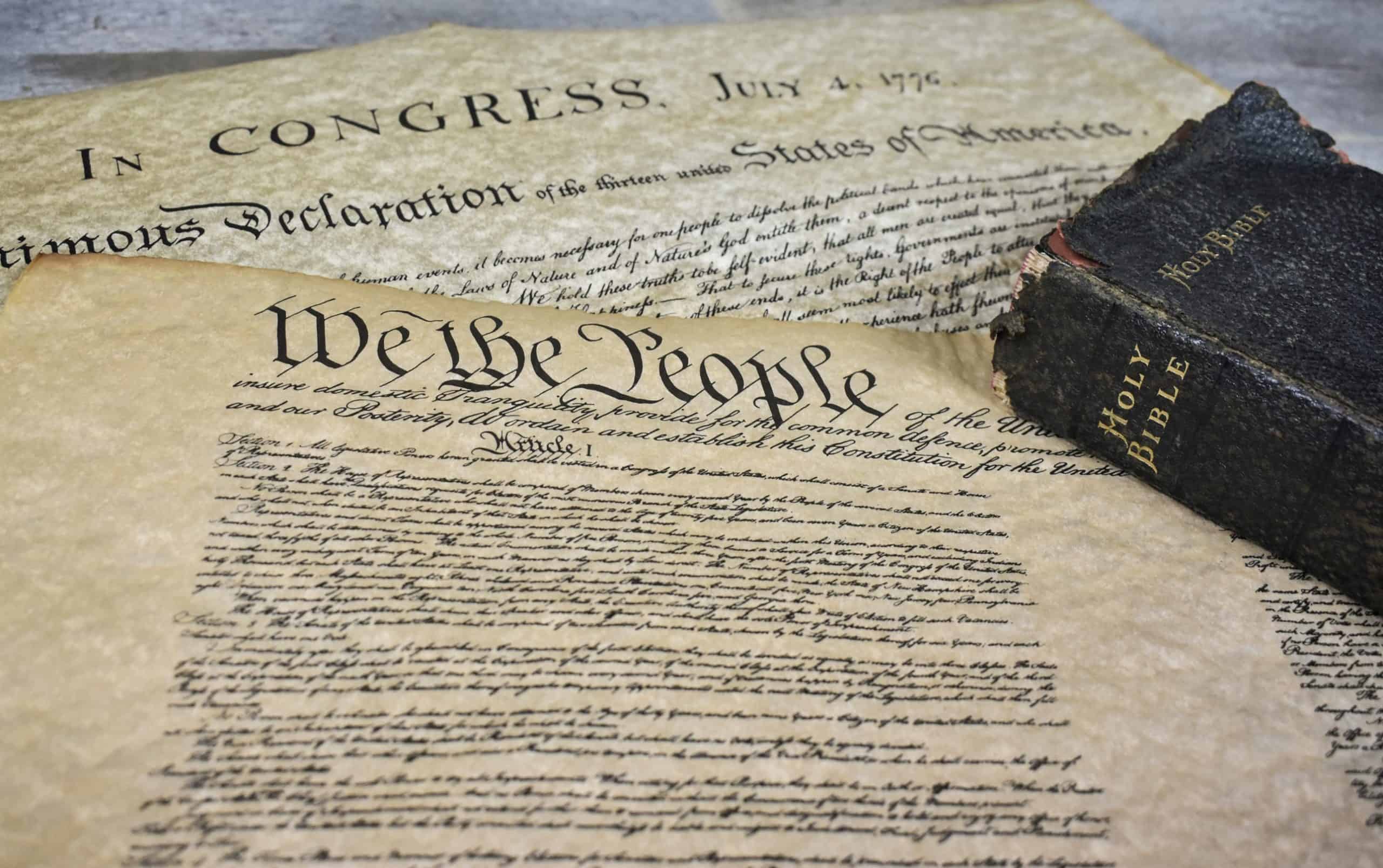We hold these truths to be self-evident, that all men are created equal, that they are endowed by their Creator with certain unalienable Rights, that among these are Life, Liberty and the pursuit of Happiness. — That to secure these rights, Governments are instituted among Men, deriving their just powers from the consent of the governed, — That whenever any Form of Government becomes destructive of these ends, it is the Right of the People to alter or to abolish it, and to institute new Government, laying its foundation on such principles and organizing its powers in such form, as to them shall seem most likely to effect their Safety and Happiness.
—United States Declaration of Independence—
Government is instituted to protect property of every sort; as well that which lies in the various rights of individuals, as that which the term particularly expresses. This being the end of government, that alone is a just government which impartially secures to every man whatever is his own.
—James Madison—
Key points: Christians have a duty before God to obey government, but that duty is not unqualified. Government’s authority is divinely delegated, so civil leaders are God’s representatives, are under His authority, and are accountable to Him.
Parts 1 and 2 of this series are available on one page here.
In his letter to the Christians in Rome, the apostle Paul wrote about the responsibilities Christians have to government before God—but he also wrote about purpose of government. Under the inspiration of the Holy Spirit, Paul said,

Romans 13:1Let every soul be subject to the governing authorities. For there is no authority except from God, and the authorities that exist are appointed by God. 2Therefore whoever resists the authority resists the ordinance of God, and those who resist will bring judgment on themselves. 3For rulers are not a terror to good works, but to evil. Do you want to be unafraid of the authority? Do what is good, and you will have praise from the same. 4For he is God’s minister to you for good. But if you do evil, be afraid; for he does not bear the sword in vain; for he is God’s minister, an avenger to execute wrath on him who practices evil. 5Therefore you must be subject, not only because of wrath but also for conscience’ sake. 6For because of this you also pay taxes, for they are God’s ministers attending continually to this very thing. 7Render therefore to all their due: taxes to whom taxes are due, customs to whom customs, fear to whom fear, honor to whom honor.
In 1 Peter 2:13-17, the apostle Peter echoes the ideas Paul presented in Romans. Like Paul, Peter also was moved along by the Holy Spirit. He declared,

2:13Therefore submit yourselves to every ordinance of man for the Lord’s sake, whether to the king as supreme, 14or to governors, as to those who are sent by him for the punishment of evildoers and for the praise of those who do good. 15For this is the will of God, that by doing good you may put to silence the ignorance of foolish men— 16as free, yet not using liberty as a cloak for vice, but as bondservants of God. 17Honor all people. Love the brotherhood. Fear God. Honor the king.
Let’s make several observations about these passages. We’ll consider seven insights in this post, and an additional three observations next time.
The Duty to Obey
First, Paul and Peter are united in their emphasis on the responsibility of citizens to “be subject to” or to “submit…to” governmental authorities. Paul indicates “every soul” has this responsibility, while Peter zeroes in on his believing audience, telling them, “submit yourselves to every ordinance of man.” God’s good design directs citizens to obey the government.
Second, governments and the leaders who represent them are “appointed by God”; therefore resisting them is resisting “the ordinance of God.” Christians are to “submit…to every ordinance of man for the Lord’s sake.”
Third, God will hold accountable those who resist and disobey civil authorities. In the words of Paul, such people “bring judgment on themselves.”
Government’s Power Is Not Absolute
Fourth, governments and their leaders have the authority they have because God has delegated it to them. The one holding a position of leadership “is God’s minister to you for good,” Paul said. Peter affirmed that those holding positions of authority hold them “for the punishment of evildoers and for the praise of those who do good.” This leads us to the next point—a very important one.

Fifth, God has delegated authority to government and its human representatives to commend those who do good and to punish evildoers. This means civil authorities don’t just represent government, but God. Again, Paul declared the ruler is “God’s minister”:
For rulers are not a terror to good works, but to evil. Do you want to be unafraid of the authority? Do what is good, and you will have praise from the same. For he is God’s minister to you for good. But if you do evil, be afraid; for he does not bear the sword in vain; for he is God’s minister, an avenger to execute wrath on him who practices evil.
Peter wrote about his readers’ obeying civil authorities “for the Lord’s sake”:
Therefore submit yourselves to every ordinance of man for the Lord’s sake, whether to the king as supreme, or to governors, as to those who are sent by him for the punishment of evildoers and for the praise of those who do good.

What does this mean in practical terms? As God’s minister, the magistrate, or officer of the state, has a specific job. What is it? Or, put another way, why is obeying those in charge a responsibility Christians must fulfill “for the Lord’s sake“? God has given civil leaders the authority they have — “the sword” — because it is His will for each of them to act as “an avenger to execute wrath on him who practices evil” and to commend those who do good. “Do what is good,” Paul wrote, “and you will have praise from the same” — the same ones who punish evildoers. Peter affirmed this very thing when he wrote that those who hold positions in government and those they send to represent them fulfill their roles “for the punishment of evildoers and for the praise of those who do good.”

Good and evil here mean good and evil according to God’s standard of righteousness, not man’s.
As Americans and as believers who affirm that God created human beings in His image, we also contend, along with our country’s Founding Fathers, that the Creator gives people “unalienable rights” that government is properly authorized to recognize and protect.1
Sixth, God wants nations to maintain societal order. We see this element woven into Peter’s statements (especially in 15-17 of 1 Peter 2), as well as in what Paul said about relationships and taxes in Romans 13:6-7. We see it even more clearly in his exhortation to Timothy to pray for civil leaders. Paul strongly indicates that discord and unrest in society hinder the spread of the gospel, while order enhances it.
1 Timothy 2:1I exhort first of all that supplications, prayers, intercessions, and giving of thanks be made for all men, 2 for kings and all who are in authority, that we may lead a quiet and peaceable life in all godliness and reverence. 3For this is good and acceptable in the sight of God our Savior, 4who desires all men to be saved and to come to the knowledge of the truth.
Another clue that the state is authorized to maintain order is the truth that civil magistrates do “not bear the sword in vain.” Their power is great because their job also is great; they need “the sword” to accomplish the task God has assigned them.
This truth carries with it a warning, however; one of which citizens, especially Christians, should be keenly aware. Those who have great power do not always wield it responsibly. Whenever and wherever government abuses its authority, great wrongs and injustices occur.
The Purpose of Government
All of these principles help us understand God’s purpose for government. According to Scripture, government exists primarily to punish those who do evil and to commend or reward those who do good. As it does these things, it also maintains order in society. Further, it upholds and protects the unalienable, God-given rights of its people, whom the Creator fashioned in His image.
Of course, other legitimate tasks exist for government, such as maintaining a military force to defend the country and maintaining monetary and economic systems. These are implicitly affirmed in the Bible, as they are assumed legitimate governmental tasks. What government is not authorized to do in Scripture is provide for its people. That is a job God gives to the people themselves.
According to Scripture, government exists primarily to punish those who do evil and to commend or reward those who do good. As it does these things, it maintains order in society. Further, it upholds and protects the unalienable, God-given rights of its people, whom the Creator fashioned in His image.
Seventh, God wants the people of a country to be free, to enjoy authentic liberty. Peter wrote, “Live as free people, but do not use your freedom as a cover-up for evil; live as God’s slaves” (1 Pet. 2:16, NIV). Authentic freedom and liberty are found in adherence to the laws of God.2
Intermission
Seven down, but we aren’t through just yet! Tune in next time for three more insights. I plan to release part 2 on Monday, April 6. Between now and then, memorize this statement that explains God’s purpose for government. Far too few Christians know what that purpose is!
As stated above,
According to Scripture, government exists primarily to punish those who do evil and to commend or reward those who do good. As it does these things, it also is maintaining order in society. Further, it is upholding and protecting the unalienable, God-given rights of its people, whom the Creator fashioned in His image.
Copyright © 2020 by B. Nathaniel Sullivan. All rights reserved.
Unless otherwise indicated, Scripture has been taken from the New King James Version®. Copyright © 1982 by Thomas Nelson, Inc. Used by permission. All rights reserved.
Scripture references cited in this article marked NIV have been taken from The Holy Bible, New International Version®, NIV® Copyright © 1973, 1978, 1984, 2011 by Biblica, Inc.® Used by permission. All rights reserved worldwide.
Notes:
1This is a principle very consistent with biblical teaching. See principle #5 in this post.
2See principle #3 in this post.
top image credit: Lightstock

Be First to Comment